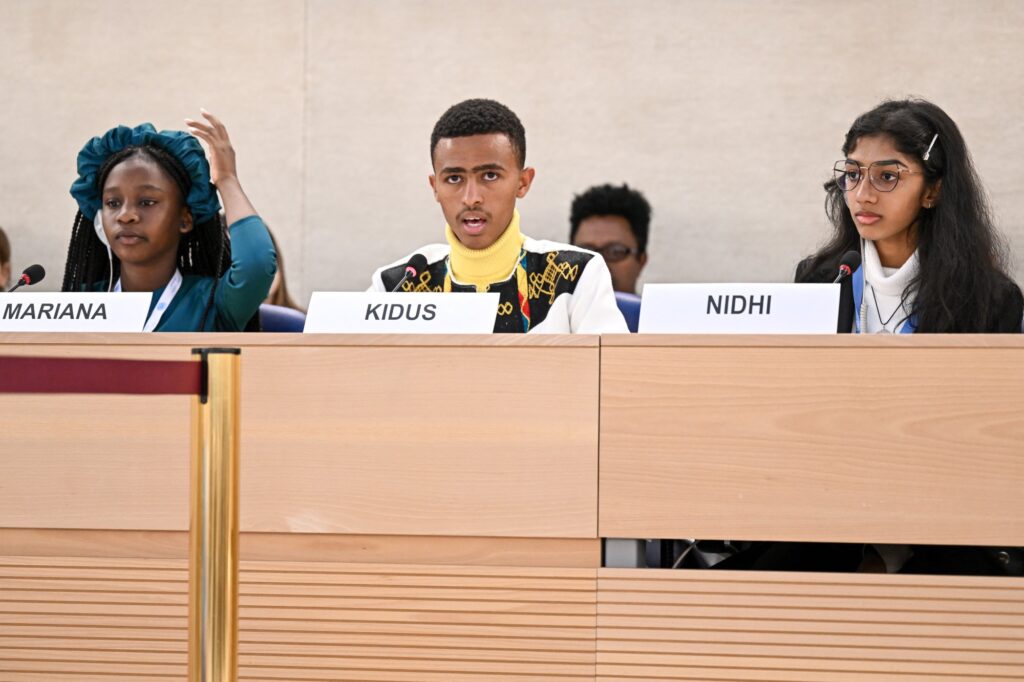Mariana has made the long journey from the rural mountains of southern Colombia to the United Nations in Geneva to denounce digital inequity and online dangers facing children like her.
“If technology and the internet are part of everyday life for people around the world, why… is this right still not accessible for all children?” the 12-year-old demanded.
Addressing the UN Human Rights Council, she highlighted statistics showing fewer than a third of households in rural Colombia have internet access at home.
Flanked by children from Ethiopia and Malaysia, as well as United Nations High Commissioner for Human Rights Volker Turk, Mariana was taking part in a UN discussion on child rights in the digital environment.
The child participants’ full names were not given.
Marking a first at the UN rights council, a majority of the panellists at Friday’s session were minors.
Children also replaced some ambassadors to voice the stance of their countries from the floor, demanding universal internet access and protection for minors in digital environments.

‘Left behind’
Turk stressed the importance of hearing from children directly about their insights into the digital world.
“When I was a child, I could barely have imagined the world you live in today,” the 57-year-old Austrian said, pointing to the “instantaneous connection with others, the knowledge and learning you have at your fingertips.”
“We have seen first-hand the promise of technology, but we know that the rapid rate of progress is not without risk.”
Like Mariana, Turk condemned the digital divide which he said meant “a staggering 2.2 billion children and young people under 25 around the globe still do not have access to the internet at home”.
“They are left behind,” he warned, stressing that “it may be time to reinforce universal access to the internet as a human right, and not just as a privilege”.
Turk and the child panelists also voiced alarm at the dangers and pressures that children who can access the internet encounter online.
“It may be time to reinforce universal access to the internet as a human right, and not just as a privilege”
‘Alarming’
Nidhi, a 14-year-old podcaster from Malaysia, said that a third of online users worldwide were children but often “they don’t even know how to use online tools safely or preserve their personal information, which makes them extremely vulnerable”.
The situation is “alarming”, she said, highlighting estimates that 72 million pieces of personal data on average are collected on every child worldwide before they turn 13.
Calling overzealous data collection practices “unethical and a violation of children’s online space,” she also slammed how inappropriate content is often pushed on youngsters.
“I distinctly remember when I was about nine years old, how scared I was when I saw a scary image while exploring a game on the internet,” she told the council, calling for more safeguards.
Kidus, a 17-year-old from Ethiopia who serves as speaker of the country’s Child Parliament, warned that digital technology “poses serious challenges affecting (children’s) well-being and rights”.
When online, he said, children are often exposed to things like pornography, disinformation and pressure to “engage in unlawful or harmful activities like joining armed groups”.
Minors in digital environments can also be vulnerable to not only cyberbullying but also sexual exploitation, prostitution and trafficking, he added.
“I implore all of you to take all legislative and administrative measures to protect children from all forms of violence, abuse and exploitation on the digital environment,” he told the council. (AFP)
For more Child articles, click here.










